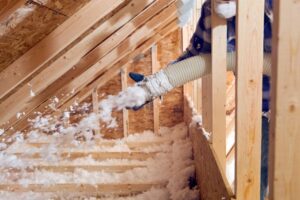Anyone can tell you that the purpose of insulation is to insulate: to keep warmth in and cold out during the winter, and to keep coolness in and heat out during the summer. Of course, this is its stated purpose. So generally, we only think of insulation in this way. Perhaps, if it’s hard to heat or cool our homes or we have certain walls that feel cold in winter or hot in summer, it crosses our minds that that wall is poorly insulated, or that we need more insulation.
But that’s not all there is to this story. Your insulation, lack of insulation, type of insulation, and the condition of your insulation can have major impacts on your indoor air quality. What are some of the ways that your insulation affects the air you breathe? We’d be happy to explain.
Moisture
Water is terrible for insulation. When it gets wet, it degrades quickly, preventing it from doing its job. This is a vicious cycle, because a lack of insulation can mean an increased likelihood of condensation buildup, which makes your insulation wetter, which makes it do a worse job, and so on.
Then comes the mold, which loves moist conditions and can flourish where moisture has degraded insulation. Having mold growing in your home means you are at risk for a whole host of health complications, like respiratory issues, irritated eyes, fatigue, headaches, and even difficulty sleeping.
One very clear sign that the problem lies in your home is if you experience these symptoms at home but they improve when you are out for the day. You should definitely have your insulation inspected and replaced if you’re experiencing any of this.
Infestation
Pests of all sorts, including rodents, bats, and insects, love to live in insulation. And when they do, they do all their business there, leaving an unsanitary mess that can contaminate the air in your home. The first step is to address the pest situation, but once they’re gone, the damaged insulation will need to be removed and the area will need to be re-insulated.
Pollutants
VOCs (Volatile Organic Compounds) and other particles are released when insulation breaks down, and those pollutants migrate into your indoor air. Some older types of insulation even contain asbestos! If you’re concerned about the age of your insulation and think it may have deteriorated, we’re here to help.
The Replacement Process
Our first step is to assess your current insulation and provide a detailed report, with recommendations for how to improve your home’s insulation and clear information about pricing. We want you to be confident in the choices you make, and getting as much information as possible will help you to make a decision you’ll be satisfied with long-term. Once you’ve decided how to move forward, we can provide blown-in insulation in Melbourne, FL, which will provide temperature consistency and dramatically improve your air quality issues.
Contact Climate Experts Air, Plumbing & Electric today to schedule an appointment with our professionals.



